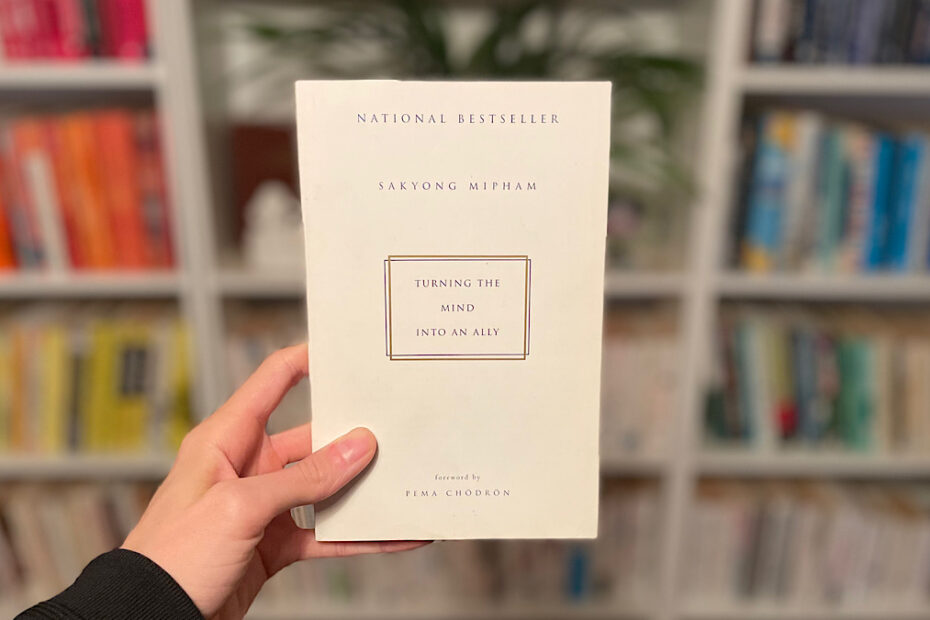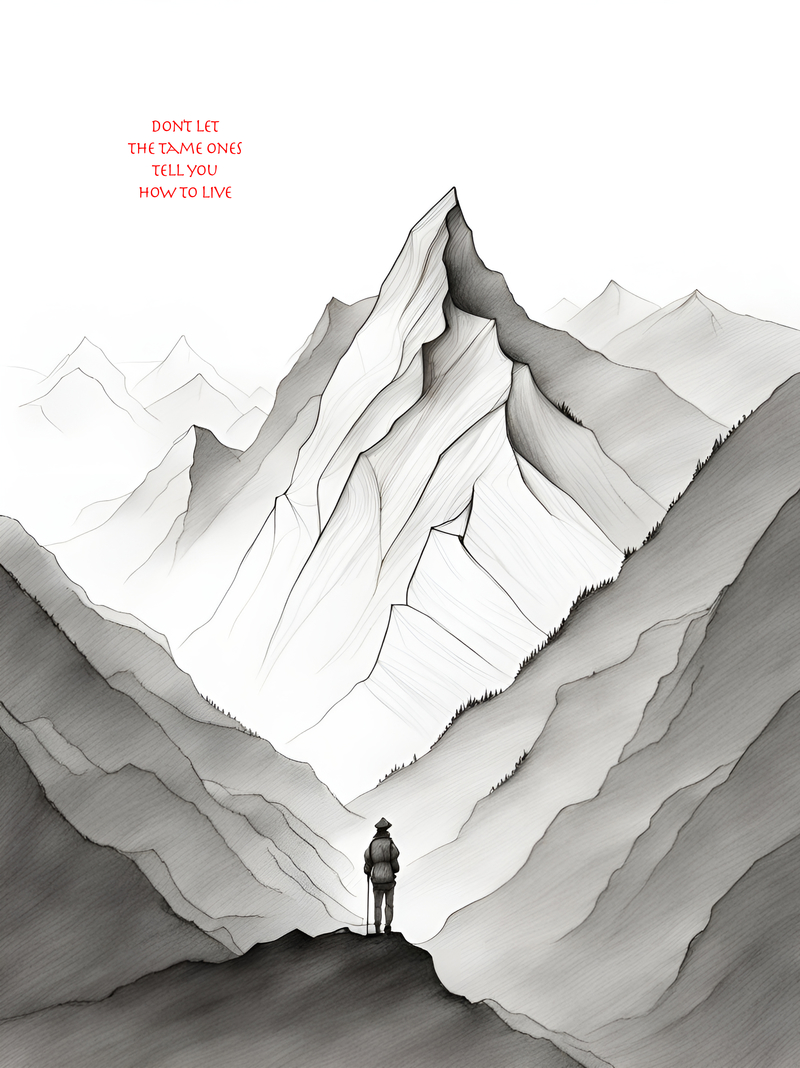Excerpt: Read our 20 Sakyong Mipham Quotes from Turning the Mind Into An Ally and take control of your wandering, cycling, distracted mind… today!
Click Here to jump right to our list of Sakyong Mipham Quotes!
Introduction: Our Minds Will Not Find Their Own Way
“Our own mind is our worst enemy. We try to focus, and our mind wanders off. We try to keep stress at bay, but anxiety keeps us awake at night… We can create an alliance that allows us to actually use our mind, rather than be used by it. This is a practice anyone can do.”
Sakyong Mipham
Strengthening, calming, and stabilizing the mind are essential first steps in accomplishing nearly any goal. Yet, for most of us, our minds are inherently weak, unstable, and all over the place in thought. With an estimated average of 12,000 to 60,000 thoughts per day—that’s 500 – 2,500 thoughts per minute (that are many times scattered and unrelated to each other)—it’s no wonder why accomplishing our goals can be so hard!
We try and strengthen our self-discipline and our mind races to thousands of conclusions on why it’s better to not be disciplined and why we should just live in accordance with our moods and feelings.
We try and stay calm in the heat of challenges and our mind pushes us to go back inside of our comfort zone and to forget about trying to accomplish something that might make us feel so uncomfortable.
We try to stay consistent with our daily actions and keep our mindset stabilized, but our mind dishes out excuse after excuse and gives us swings in our moods that make it incredibly hard to stay on track day after day.
Our minds are out of control and many of us might not even be aware of it.
So how do we regain control of our mind? How can we strengthen our mind to overcome the constant challenges and struggles of life? How can we calm our mind and focus its incredible power and energy into tasks of deep meaning and importance rather than tasks of insignificance and distraction?
In Turning the Mind into An Ally, Sakyong Mipham sets out to show us how.
NEW In The Shop: Don’t Let The Tame Ones Tell You How To Live [Poster]
Why We ♥ It: Some of the best advice I (Matt here) ever got was: don’t take life advice from people who aren’t living a life you want to live and don’t take criticism from people you wouldn’t go to for advice. I created this poster to act as a reminder to listen more closely to our role models and less closely to our critics, trolls, and tamed-comfort-zone-hugger acquaintances. It’s also a perfect gift for the outdoor adventurer, travel enthusiast, or solo explorer (or soon to be). Available in print or digital download. 👇🏼
...Want to advertise your book, product, or service? Send inquiries to matt@movemequotes.com.
First, we have to accept full responsibility for this task and understand that turning our mind from an adversary to an ally is a mission that rests solely on us.
It is of no fault to anyone else that our minds are untamed and chaotic. We are the only ones who hold the keys to the doors of our mind and we are the only ones who can open the doors and make changes—nobody else.
Once we accept this truth, Mipham shows us the way through meditation. Practicing meditation is the way in which we strengthen, calm, and stabilize our mind—and it’s one of the only tools we really have to do that.
Without a daily meditation practice, our minds will continue to spiral thoughts out of control and we will continue living with a disconnect to our mind.
Mipham further emphasizes the importance of meditation and suggests that, “Taming our mind isn’t a hobby or an extracurricular activity—it’s the most important thing we could be doing.” And setting up a daily practice is pivotal to the success of our mental development—our minds will not find their way on their own.
Below, you will find 20 of our favorite quotes from Mipham’s book, Turning the Mind Into An Ally. Each quote will give you more context and insight into Mipham’s message and will hopefully bring you some clarity.
As of the date of this writing, I, too, am setting forth on the path of turning my mind from an adversary into an ally. Daily meditation is a practice that I have not yet successfully integrated into my daily routine.
But, with Mipham’s help and some focused mental effort, I can see the way and plan on keeping meditation as a top daily priority. Maybe with some luck, it’ll do the same for you.
The List: 20 Practical and Timely Sakyong Mipham Quotes on How To Turn the Mind Into An Ally
“If we want to undo our own bewilderment and suffering and be of benefit to others and the planet, we’re going to have to be responsible for learning what our own mind is and how it works, no matter what beliefs we hold. Once we see how our mind works, we see how our life works, too. That changes us.”
Sakyong Mipham, Turning the Mind Into An Ally (Page 5)
“With an untrained mind, we’ll live most days of our lives at the mercy of our moods. Waking up in the morning is like gambling: ‘What mind did I end up with today? Is it the irritated mind, the happy mind, the anxious mind, the angry mind, the compassionate mind, or the loving mind?’ Most of the time we believe that the mind-set we have is who we are and we live our day from it.”
Sakyong Mipham, Turning the Mind Into An Ally (Page 20)
“We have to accept responsibility for the state of our own mind; it doesn’t work to blame others for our confusion or expect them to encourage or confirm us in our practice. We have to look to ourselves as the source of our own confusion—and our own enlightenment.”
Sakyong Mipham, Turning the Mind Into An Ally (Page 98)
“We’ve been born in a time and place where we have the luxury of hearing, contemplating, and putting into action teachings that awaken us to our enlightened mind. We’re relatively healthy, we have a roof over our head and food in our mouths. We have family and friends. We’ve encountered someone who can teach us how to train our mind and open our heart. Being threatened by nuclear war, terrorism, and global warming is a reminder that we can’t take such conditions for granted. We’re just these tiny vulnerable beings riding on a blue dot in space. Yet sometimes we act as if we’re the center of the universe. The enlightened alternative is to appreciate how incredibly rare and precious human life is. The enlightened alternative is to appreciate everything. By appreciating whatever we encounter, we can use it to further our journey of warriorship. We are good as we are, and it is good as it is. Once we have this understanding, we’ll see that we are living in a sacred world.”
Sakyong Mipham, Turning the Mind Into An Ally (Page 143)
“I’ve said before that our bewildered mind is like a wild horse. I have a very high regard for horses. When I was in high school, I spent some time working on a ranch in West Texas. A stallion in the distance on the high plains is a powerful sight to behold. We don’t tame such a strong majestic creature by beating the spirit out of it. Instead, we work with its raw power and turn that energy in a certain direction. Where do we want to take that horse? Where do we want to go riding? We want to make a real journey. We want to ride in the meadows of compassion, the gardens of awakened heart, the fields of wisdom. This is the essence of the practice of contemplation: we learn to direct the energy of our mind toward enlightenment.”
Sakyong Mipham, Turning the Mind Into An Ally (Page 132)
“Beginning meditation practice is an excellent opportunity to contemplate how we spend our time. How much of what we do is important and truly necessary? One of the obstacles to meditation is being pulled in too many directions. What drains us; what nourishes us? Are there activities we can postpone or eliminate? It will be helpful to ask questions like these at the outset. Awareness lays the ground for a strong commitment to practice. Taming our mind isn’t a hobby or an extracurricular activity—it’s the most important thing we could be doing. It can even help streamline a pressured situation because it gives us clarity, peace, and fortitude. So while we may need to simplify our life in order to meditate, a benefit of meditation is that it will make our life simpler.”
Sakyong Mipham, Turning the Mind Into An Ally (Page 216)
“The point of awareness—and the point of meditation, for that matter—is to know what’s happening. We have to be awake. Otherwise we fall into lethargy, which is one step away from sleep. Without awareness, meditation will lead nowhere. In the first stages of peaceful abiding, awareness acts as a spy who watches us meditate, alerting mindfulness to bring us back to the breath when we stray. For a while it might be clumsy and intrusive, because as beginners we need to be watching constantly. But as we practice, awareness continues to develop. The mind becomes more stable, and our ability to know what’s happening becomes stronger. Awareness becomes the sheriff who can sense that our mind is about to become distracted and remedy the situation before it even occurs. We don’t see the sheriff running around everywhere; we just know he’s there. Because we have more confidence, awareness no longer feels intrusive.”
Sakyong Mipham, Turning the Mind Into An Ally (Page 107)
“To meet our basic goodness, we meditate. Through peaceful abiding, we learn to rest fearlessly in our natural state. We see what an enlightened being sees: basic goodness is the ground of being, the nature of everything; it’s an indestructible continuum, a diamond hologram with infinite facets. Through contemplation we discover that, like the reflection of a jewel in the sunlight, it is empty. In continuing to contemplate, we see that this emptiness is vibrant and dynamic—a playful display of thoughts, emotions, and perceptions. This is luminosity.”
Sakyong Mipham, Turning the Mind Into An Ally (Page 198)
“Obviously, meditation can sometimes be difficult. We may want to run away from practice, run from the cushion, even run from the word ‘meditation.’ We can run as far as we like, but what we’ll discover is that there is no better environment than meditation in which to build the stability, clarity, and strength of our mind. At the same time, the difficulty of making it to the cushion, the difficulty of staying with the technique, the difficulty of abandoning discursiveness, isn’t going to disappear. In procrastinating, we’re avoiding the one thing that really is going to make a difference in our lives. Meditation stabilizes us in our inherent power as humans. It introduces the possibility of living our lives in a continually conscious, confident, and balanced state of mind.”
Sakyong Mipham, Turning the Mind Into An Ally (Page 91)
“Like weeding a garden, dealing with obstacles is an ongoing aspect of meditation. Working with these challenges on the cushion is another way we build confidence and courage to go further. We can be grateful for obstacles, because they push us forward in our practice. After a while it is even possible to feel a spark of delight when we see an obstacle coming up, because we know it’s an opportunity to keep sharpening our minds. The more obstacles we face, the more confidence we feel to deal with them.”
Sakyong Mipham, Turning the Mind Into An Ally (Page 86)
“Generosity, discipline, patience, exertion, meditation, and wisdom keep turning our mind to enlightenment like a flower seeking sunlight. This brings genuine delight. The more awake we are, the more connected we feel with other sentient beings. The more awake we are, the more we want to help others achieve the same freedom.”
Sakyong Mipham, Turning the Mind Into An Ally (Page 210)
“It’s fine to take pleasure, to enjoy good food, and to listen to beautiful music. Becoming curious about how we suffer doesn’t mean that we can no longer enjoy eating ice cream. But once we begin to understand the bewilderment of our untrained mind, we won’t look to the ice cream and say, ‘That’s happiness.’ We’ll realize that the mind can be happy devoid of ice cream. We’ll realize that the mind is content and happy by nature.”
Sakyong Mipham, Turning the Mind Into An Ally (Page 23)
“We can say ‘blue,’ but until we see the color blue, we don’t really know what the meaning is. We can say that something is hot, but until we touch it, we don’t know what ‘hot’ means. We can talk about bringing our mind to compassion by saying ‘May all sentient beings be free from suffering and the root of suffering,’ but until we feel the pain of others, ‘pain’ is only a word. We have to crack its shell to let its meaning infuse us, seep into our lives.”
Sakyong Mipham, Turning the Mind Into An Ally (Page 133)
“When we’re in any kind of pain, we can use it to open our hearts to the reality that people are always suffering. Pain is something everyone experiences. We can use it to ground us in the fundamental truth of our being. Pain gives us firsthand experience by which to be kind and generous to others. It gives us direct access through our empathy to helping others. We can use pain to activate compassion. We’d like others not to experience pain, and we can extend ourselves to them. We can contemplate the words, ‘May all beings be free of pain.’ Our direct experience of pain only makes our wish more potent. It may even decrease our pain, because it increases our joy. This becomes a wonderful meditation, to sit there and contemplate the relief of pain and suffering of everyone, of the whole world—not only because it changes our attitude toward our own pain, but also because it’s opening our mind of enlightenment. This kind of prayer is always healing.”
Sakyong Mipham, Turning the Mind Into An Ally (Page 144)
“We often conduct our life as though it’s going to last forever. With this attitude, we want everything. The fact of death puts a limit on what we can have, what we can do. We don’t need to think about death all the time, but to ponder it, to contemplate it, gives us perspective and inspiration about living our life. It also makes us less spoiled. It makes us look at the balance of our life and determine what needs to come first. What is important to me? How shall I use my life? We’re able to enter situations more openly once we’ve related with death. It makes our love more powerful.”
Sakyong Mipham, Turning the Mind Into An Ally (Page 156)
“Understanding the meaning of impermanence makes us less desperate people. It gives us dignity. We no longer grasp at pleasure, trying to squeeze out every last drop. We no longer consider pain something we should fear, deny, and avoid. We know that it will change.”
Sakyong Mipham, Turning the Mind Into An Ally (Page 150)
“Impermanence is always pounding at the door. Of course, acknowledging impermanence doesn’t mean we get permanence. It means we’re more in tune with reality; we can relax. As we relinquish our attachment to permanence, pain begins to diminish because we’re no longer fooled. Accepting impermanence means that we spend less energy resisting reality. Our suffering has a more direct quality. We’re no longer trying to avoid it. We see that impermanence is a river that runs through life, not a rock that stands in the way. We see that because we resist impermanence, pain and suffering are constants. We realize that pain comes from our desire for permanence.”
Sakyong Mipham, Turning the Mind Into An Ally (Page 147)
“In Tibet people don’t seem to worry as much about aging. When I hear my mother and her generation of Tibetans talk about getting old, the tone in their voice is proud. They’re proud to have lived so long. They’re cheerful. They have young minds. They’re continuously curious, always learning. One of my favorite Tibetan saying is ‘Even if you’re going to die tomorrow, you can learn something tonight.’ With this attitude we don’t feel so old.”
Sakyong Mipham, Turning the Mind Into An Ally (Page 152)
“Contemplating impermanence can be a liberating experience, one that brings both sobriety and joy. In essence, we become less attached. We realize we can’t really have anything. We have money and then it’s gone; we have sadness and then it’s gone. No matter how we want to cling to our loved ones, by nature every relationship is a meeting and parting. This doesn’t mean we have less love. It means we have less fixation, less pain. It means we have more freedom and appreciation, because we can relax into the ebb and flow of life.”
Sakyong Mipham, Turning the Mind Into An Ally (Page 150)
“The journey of the bodhisattva warrior starts with the basic attitude of enlarging our motivation to include the welfare of others. This is a simple response to this dark age. Let’s begin right now by engaging love and compassion however we can—not tomorrow, but today. By cultivating courage and confidence in ourselves and maintaining our seat, we can enjoy creating a sane environment; we can enjoy creating an enlightened society. This doesn’t have to be overwhelming. Start by looking at your own life and see what you can do, one step at a time. Love is the saving grace.”
Sakyong Mipham, Turning the Mind Into An Ally (Page 212)
Sakyong Mipham Picture Quotes To Share:
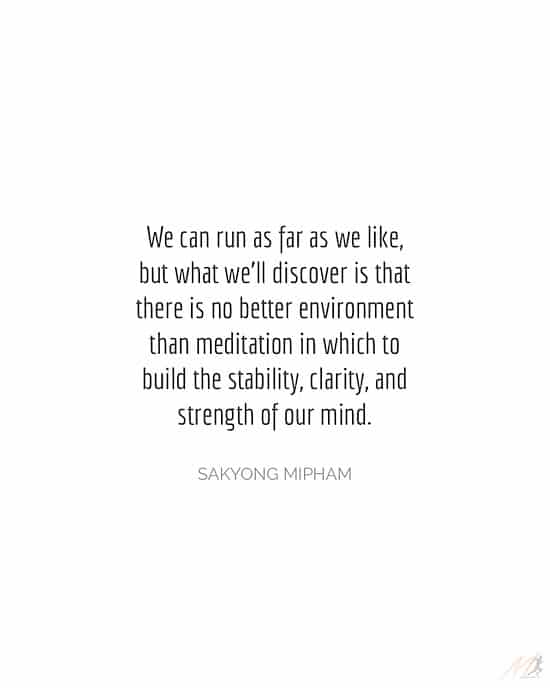
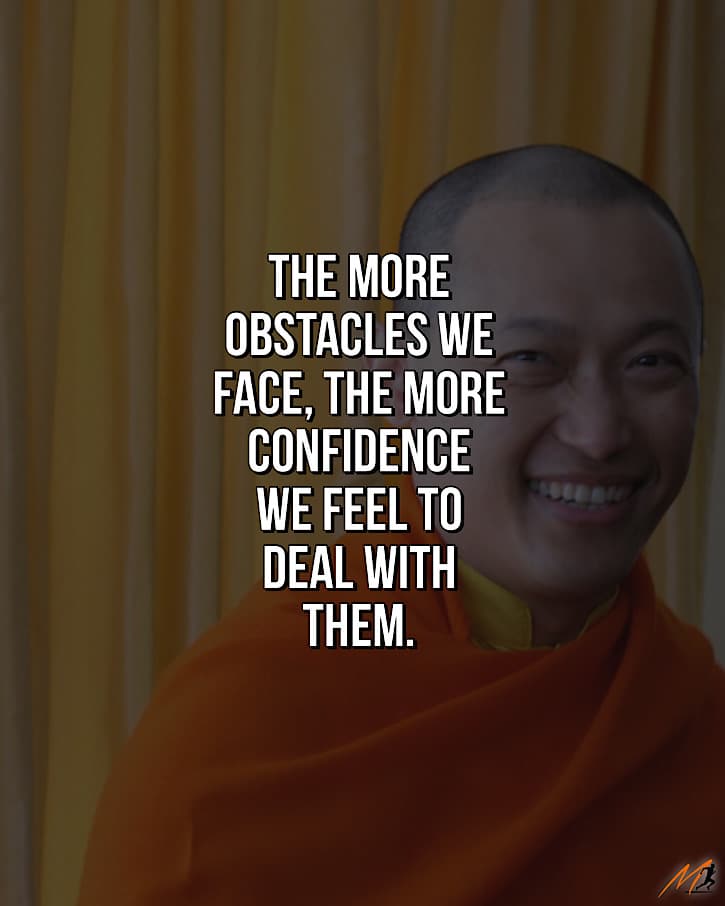
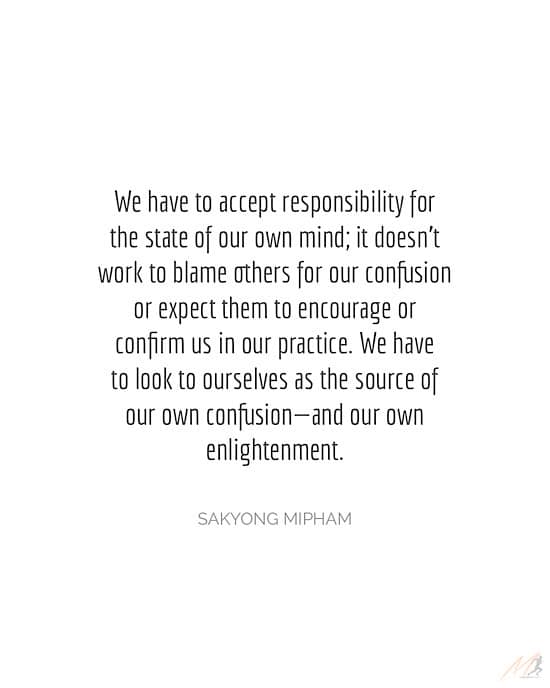
If you enjoyed these Sakyong Mipham quotes from Turning the Mind Into An Ally then you should definitely check out his book in full. It comes warmly recommended:
Top 5 Related Posts To Read Next:
- How Do I Know If Meditation Is Working?
- 47 Deep and Insightful Ryan Holiday Quotes from Stillness is the Key
- 25 Life-Altering Quotes On How Mindset Changes Everything
- 13 Pico Iyer Quotes from The Art of Stillness to Inspire Your Next Trip to… Nowhere?
- 19 Quotes from Narrow Road To The Interior on Solitude, Travel, and Poetry
NEW In The Shop: Don’t Let The Tame Ones Tell You How To Live [Poster]
Why We ♥ It: Some of the best advice I (Matt here) ever got was: don’t take life advice from people who aren’t living a life you want to live and don’t take criticism from people you wouldn’t go to for advice. I created this poster to act as a reminder to listen more closely to our role models and less closely to our critics, trolls, and tamed-comfort-zone-hugger acquaintances. It’s also a perfect gift for the outdoor adventurer, travel enthusiast, or solo explorer (or soon to be). Available in print or digital download. 👇🏼
...Want to advertise your book, product, or service? Send inquiries to matt@movemequotes.com.

Written by Matt Hogan
Founder of MoveMe Quotes. On a mission to help busy people do inner work—for better mental health; for healing; for personal growth. Find me on Twitter / IG / Medium. I also share daily insights here. 🌱
It has taken me 1,000’s of hours to build this free library for you. If it has helped you, you can support my continued effort here. ☕️
